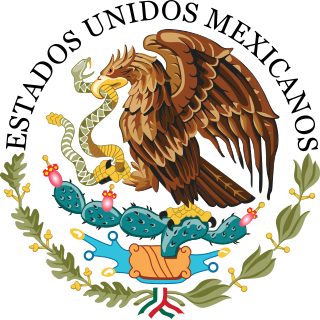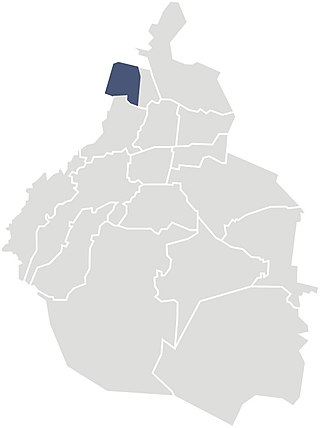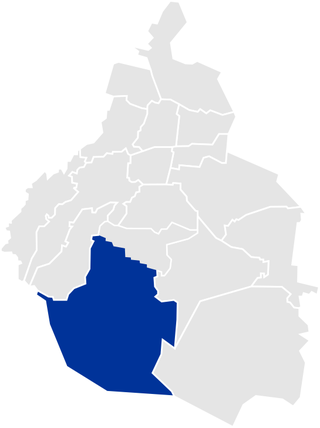Results
| | This section is empty. You can help by adding to it. (June 2011) |
Elections in the Mexican Federal District (Mexico City) were held on Sunday, 2 July 2006. Voters went the polls to elect, on the local level:
| | This section is empty. You can help by adding to it. (June 2011) |
The winner of the Head of Government contest was Marcelo Ebrard of the Party of the Democratic Revolution, in alliance with the Labor Party and Convergence (the "Alliance for the Good of All"). The Federal District Electoral Institute (IEDF) formally announced his victory on 5 July 2006 and presented him with his certificate of majority.
| Party/Alliance | Pictures | Candidate | Votes | % |
|---|---|---|---|---|
| Alliance for the Good of All (PRD, PT, Convergence) | | Marcelo Ebrard | 2,215,147 | 47.05 |
| National Action Party | Demetrio Sodi | 1,302,097 | 27.66 | |
| Alliance for Mexico (PRI, PVEM) |  | Beatriz Paredes | 1,031,334 | 21.91 |
| New Alliance Party | Alberto Cinta | 109,133 | 2.32 | |
| Social Democratic and Farmer Alternative | Gustavo Jiménez Pons | 50,482 | 1.07 |
In the sixteen borough mayoral races, the PRD-led alliance was victorious in fourteen (the thirteen it already held, plus Milpa Alta gained from the PRI), with the PAN retaining the two (Benito Juárez, D.F. and Miguel Hidalgo, D.F.) that it had won in the 2003 election.
The PRD-led alliance won in 36 of the 40 single-member local constituencies for the Legislative Assembly, with the PAN winning the other four. The additional 26 deputies assigned on the basis of proportional representation in accordance with the parties' total vote numbers were distributed as follows: PAN, 12; PRI, 4; PVEM, 4; Nueva Alianza, 4; and Alternativa, 2.
| Date | Publisher | Ebrard | Paredes | Sodi |
|---|---|---|---|---|
| November 13, 2005 | El Universal | 45% | 16% | 15% |
| November 3, 2005 | GEA-ISA | 61% | 25% | 14% |
| January 18, 2006 | Parametría | 66% | 14% | 18% |
| January 22, 2006 | Reforma | 60% | 18% | 20% |
| January 22, 2006 | GEA-ISA | 58% | 16% | 26% |
| January 29, 2006 | El Universal | 47% | 16% | 13% |
| February 19, 2006 | GEA-ISA | 65% | 17% | 16% |
| March 19, 2006 | Reforma | 57% | 18% | 23% |
| March 19, 2006 | GEA-ISA | 42% | 33% | 23% |
| March 29, 2006 | Parametría | 55% | 22% | 21% |
| April 9, 2006 | Reforma | 52% | 23% | 23% |
| April 30, 2006 | GEA-ISA | 46% | 28% | 24% |
| May 28, 2006 | Reforma | 51% | 23% | 25% |
| May 28, 2006 | GEA-ISA | 48% | 27% | 23% |
| June 21, 2006 | Reforma | 47% | 22% | 28% |
| June 21, 2006 | El Universal | 53% | 22% | 23% |

The politics of Mexico function within a framework of a federal presidential representative democratic republic whose government is based on a multi-party congressional system, where the President of Mexico is both head of state and head of government. The federal government represents the United Mexican States and is divided into three branches: executive, legislative and judicial, as established by the Political Constitution of the United Mexican States, published in 1917. The constituent states of the federation must also have a republican form of government based on a congressional system as established by their respective constitutions.

The National Action Party is a conservative political party in Mexico founded in 1939. The party is one of the main political parties in Mexico, and since the 1980s has had success winning local, state, and national elections.

The Party of the Democratic Revolution is a social democratic political party in Mexico. The PRD originated from the Democratic Current, a political faction formed in 1986 from the Institutional Revolutionary Party (PRI). The PRD was formed after the contested general election in 1988, which the PRD's immediate predecessor, the National Democratic Front, believed was rigged by the PRI. This sparked a movement away from the PRI's authoritarian rule.

The Congress of the Union, formally known as the General Congress of the United Mexican States, is the legislature of the federal government of Mexico consisting of two chambers: the Senate of the Republic and the Chamber of Deputies. Its 628 members meet in Mexico City.

The Chamber of Deputies is the lower house of the Congress of the Union, the bicameral parliament of Mexico. The other chamber is the Senate. The structure and responsibilities of both chambers of Congress are defined in Articles 50 to 70 of the constitution.

The Mexican state of Chihuahua held an election on Sunday, 4 July 2004. At stake was the office of the Chihuahua State Governor, all 33 members of the unicameral Chihuahua State Congress, and 67 mayors and municipal councils.

The Labor Party is a political party in Mexico. It was founded on 8 December 1990. The party is currently led by Alberto Anaya.

Marcelo Luis Ebrard Casaubón is a Mexican politician who served as Secretary of Foreign Affairs until 2023. Affiliated with the National Regeneration Movement (MORENA) since 2018, he was appointed to lead the foreign ministry by President Andrés Manuel López Obrador on 1 December 2018. In June 2023, he resigned from his post to compete for his party's presidential candidacy for the 2024 election.
Demetrio Javier Sodi de la Tijera is a Mexican journalist, businessman and politician who has served in the upper and lower houses of the Congress of the Union, and as head of Miguel Hidalgo borough from 2009 to 2012. In 2006, he unsuccessfully ran as the National Action Party (PAN) candidate for the Head of Government of the Federal District. A member of the Sodi family, he is the cousin of the actress and singer Thalía.

Legislative elections were held in Mexico on 6 July 2003. Although the National Action Party received the most votes, the Institutional Revolutionary Party won 224 of the 500 seats. Voter turnout was only 41%.

The First Federal Electoral District of the Federal District(I Distrito Electoral Federal del Distrito Federal) is one of the 300 Electoral Districts into which Mexico is divided for the purpose of elections to the federal Chamber of Deputies and one of 27 such districts in the Federal District.

The Third Federal Electoral District of the Federal District(III Distrito Electoral Federal del Distrito Federal) is one of the 300 Electoral Districts into which Mexico is divided for the purpose of elections to the federal Chamber of Deputies and one of 27 such districts in the Federal District.

The Fourth Federal Electoral District of the Federal District(IV Distrito Electoral Federal del Distrito Federal) is one of the 300 Electoral Districts into which Mexico is divided for the purpose of elections to the federal Chamber of Deputies and one of 27 such districts in the Federal District.

The Eleventh Federal Electoral District of the Federal District(XI Distrito Electoral Federal del Distrito Federal) is one of the 300 Electoral Districts into which Mexico is divided for the purpose of elections to the federal Chamber of Deputies and one of 27 such districts in the Federal District.

The Thirteenth Federal Electoral District of the Federal District(XIII Distrito Electoral Federal del Distrito Federal) is one of the 300 Electoral Districts into which Mexico is divided for the purpose of elections to the federal Chamber of Deputies and one of 27 such districts in the Federal District.

The Fourteenth Federal Electoral District of the Federal District(XIV Distrito Electoral Federal del Distrito Federal) is one of the 300 Electoral Districts into which Mexico is divided for the purpose of elections to the federal Chamber of Deputies and one of 27 such districts in the Federal District.
The Sixteenth Federal Electoral District of the Federal District(XVI Distrito Electoral Federal del Distrito Federal) is one of the 300 Electoral Districts into which Mexico is divided for the purpose of elections to the federal Chamber of Deputies and one of 27 such districts in the Federal District.

A number of elections, both federal and local, were scheduled to take place in Mexico during 2009.

Gubernatorial elections were held in fourteen Mexican states on Sunday, July 4, 2010. The gubernatorial elections were held simultaneously with other state and local elections. Elections for governor were held in Aguascalientes, Chiapas, Chihuahua, Durango, Hidalgo, Oaxaca, Puebla, Quintana Roo, Sinaloa, Tamaulipas, Tlaxcala, Veracruz and Zacatecas.

Legislative elections were held in Mexico on 6 June 2021. Voters elected 500 deputies to sit in the Chamber of Deputies for the 65th Congress. These elections took place concurrently with the country's state elections.